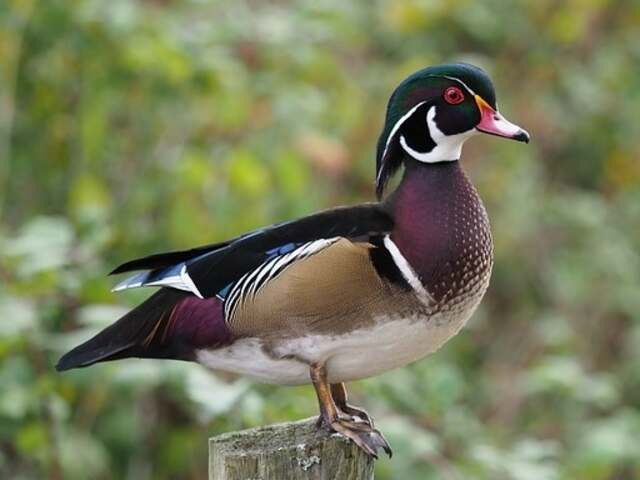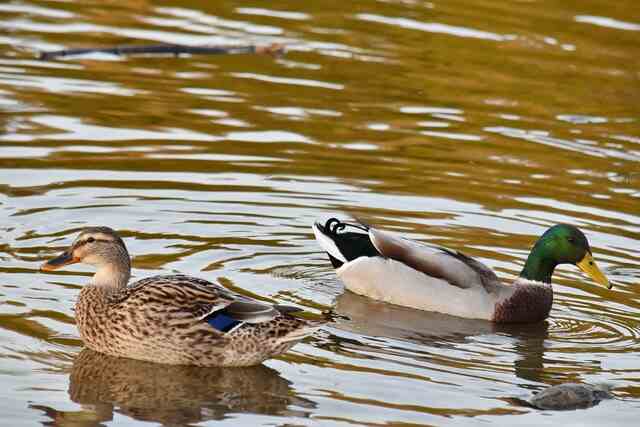Have you ever found yourself with leftover grapes and wondered, “Do ducks eat grapes?” The simple answer is yes, but there’s much more to the story than just a simple yes or no answer.
As it turns out, feeding grapes to ducks can have surprising benefits, but also some potential drawbacks. In this article, we’ll explore the ins and outs of feeding grapes to ducks, so grab a handful of grapes and join us!
Table of Contents
- 1 The Natural Diet of Ducks
- 2 Domesticated Ducks’ Diet
- 3 Can Ducks Eat Grapes?
- 4 The Nutritional Value of Grapes for Ducks
- 5 How to feed grapes to ducks safely
- 6 Other Fruits and Vegetables that are Safe for Ducks
- 7 List of Other Foods that Can be Given as Treats
- 8 Explanation of Why Variety is Important in a Duck’s Diet
- 9 Conclusion
- 10 FAQs: Do Ducks Eat Grapes?
- 10.1 Can ducks eat grapes?
- 10.2 Are grapes safe for ducks to eat?
- 10.3 What other fruits can ducks eat?
- 10.4 Can ducks eat grapes with the skin on?
- 10.5 Can baby ducks eat grapes?
- 10.6 Can ducks eat raisins?
- 10.7 Should grapes be given as a regular part of a duck’s diet?
- 10.8 Can ducks eat frozen grapes?
- 10.9 Can ducks eat grape seeds?
- 10.10 Are there any risks of feeding grapes to ducks?
- 11 Author
What is the diet of a duck?
As mentioned earlier, ducks have an omnivorous diet but depending on various factors like habitat and climate; their diets may vary slightly.
For example, mallards mainly feed on plants, while other species like mergansers may rely heavily on fish for survival.
Their natural diet comprises primarily of plants such as seeds from grasses or grains; fruits like berries; leaves and stems of aquatic plants.
They also eat insects such as beetles or grasshoppers; worms; snails or mollusks, which provide them with valuable protein required for healthy growth.
However, when domesticated farmers raise ducks commercially – they sometimes supplement their diet with commercial feed pellets that have all the essential vitamins and minerals required for healthy growth.
The Question: Do Ducks Eat Grapes?
Now coming back to our question – do ducks eat grapes? Yes! Ducks can safely consume grapes- both white seedless as well as red varieties.
While grapes are not a natural food source for ducks, they do enjoy eating them as treats occasionally. Next, we will explore why grapes are safe for ducks to consume and the nutritional value they offer to our feathered friends.
The Natural Diet of Ducks
Ducks are omnivores, which means they eat both plant and animal matter. In the wild, they have a varied diet that largely depends on their environment. This includes ponds, lakes, rivers, and wetlands, where they can find plenty of food sources.
Plant matter is an essential part of a wild duck’s diet. They consume a variety of grasses, seeds, roots, and aquatic plants such as duckweed and water lilies.
The fibrous plant material provides roughage that helps to keep their digestive system healthy. Insects are another important component in a wild duck’s diet.
They are rich in protein and provide energy for the ducks to fly long distances during migration periods. Some common insects ducks eat include crickets, beetles, dragonflies, and flies.
Small aquatic animals such as snails and worms also make up a significant portion of a wild duck’s diet. These animals are high in nutrients like calcium and iron which help maintain healthy bones and blood circulation.
Ducks are also known to feed on small fish like minnows or young frogs if they can catch them while swimming in the water.
Overall, wild ducks have access to many different types of food sources thanks to their habitat diversity in the wild.
What do Wild Ducks Eat?
Wild ducks have access to many different food sources due to their natural habitat diversity; however, here is what most will eat:
• Plants: including grasses seeds roots, aquatic plants such as duckweed and water lilies.
• Insects: including crickets beetles dragonflies flies
• Small aquatic animals: snails worms small fish like minnows or young frogs if caught while swimming
The above list is just some examples of what you might see a wild duck eating, but there really isn’t much that is off limits for them when it comes to their diet.
Domesticated Ducks’ Diet
From Natural to Commercial Feed
Ducks in the wild have a varied diet that depends on the season and their habitat. They eat a lot of plant matter, insects, and small aquatic animals, which provide them with all the nutrients they need.
This diet is very different from what domesticated ducks usually eat. Most people who keep ducks as pets or for commercial purposes feed them commercial feed that’s specifically formulated for poultry.
Commercial feed is convenient and can help ensure that ducks get all the nutrients they need. It can also help prevent malnutrition or overfeeding.
However, it’s important to note that not all commercial feeds are created equal. Some brands contain more fillers than actual nutrients, so it’s essential to read the labels carefully before buying.
Comparison to Wild Ducks’ Diet
The shift from an all-natural diet to a commercial one comes with some downsides. Domesticated ducks tend to lack variety in their food intake compared to their wild counterparts.
Their diets are often imbalanced and focused on just one or two types of food sources. Wild ducks have access to more than enough food options in their natural habitats.
They can spend hours grazing on grasses, weeds, seeds, and other vegetation around them. They also feast on aquatic insects such as mosquitoes and dragonflies found in ponds, streams or wetlands.
Discussion of How Domesticated Ducks Are Often Fed Commercial Feed
Domesticated ducks are often fed homemade diets made up of grains such as cracked corn or wheat mixed with supplements like vitamins and minerals;
however, these diets may lack certain nutrients important for duck health such as vitamin A or E which can lead to deficiencies if not supplemented properly.
Commercial feeds offer a balanced mixture of protein from soybeans – essential amino acids needed for growth – along with carbohydrates from grains and fats from vegetable oils.
It is usually fortified with essential vitamins and minerals, which makes it an excellent choice for domesticated ducks.
Overall, domesticated ducks are fed commercial feed primarily because it’s convenient and low-maintenance.
Just like any other type of animal, ducks need a balanced diet to thrive.
While commercial feeds may be the ideal option for domesticated ducks, it’s important to supplement their diets with treats and fresh fruits and vegetables to offer variety and keep them healthy.
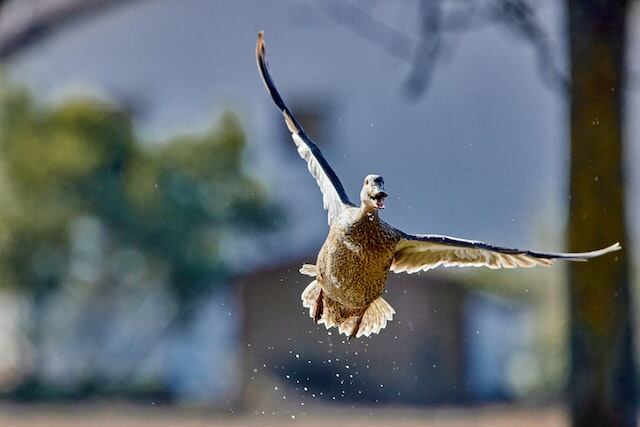
Can Ducks Eat Grapes?
Ducks have an omnivorous diet, which indicates that they consume both animal and plant-based food. They have a diverse diet that can vary depending on their natural habitat, whether they are domesticated or wild, and their individual preferences.
So, can ducks eat grapes? The answer is yes!
In fact, ducks seem to love grapes. They are safe for them to consume as long as they are given in moderation.
Grapes are not toxic to ducks; therefore, it’s safe for them to consume without any issues. Ducks enjoy a variety of foods that includes fruits and vegetables along with insects and small aquatic animals.
Even though grapes don’t have significant nutritional value for ducks when compared to other foods like corn or peas, they still make a great treat for them.
It’s essential to note that while grapes may be safe for consumption by ducks, some types of fruit like avocados can be deadly if consumed by birds.
So it’s always better to research the food before giving it to your feathered friends. If you’re unsure about a particular food item’s safety, it is always better not to risk feeding it.
Feeding grapes as an occasional treat will not harm your duck’s health; instead will keep them happy and satisfied while adding some variety into their diet.
However, overfeeding them with too many treats or providing spoiled fruit could cause health problems for your feathered friend in the long run.
The Nutritional Value of Grapes for Ducks
As it turns out, grapes are not only safe for ducks to eat, but they can also provide several nutritional benefits. These sweet and delicious fruits are packed with vitamins and minerals that can help maintain your feathered friends’ health.
Grapes are a good source of vitamin C, which helps boost the immune system and keep ducks healthy. This water-soluble vitamin is also important for collagen production, which helps keep their skin and feathers healthy.
Additionally, grapes contain vitamin K, which is essential for blood clotting. In terms of minerals, grapes contain potassium, which aids in muscle function and nerve transmission.
They also contain small amounts of calcium, phosphorus, magnesium, and iron – all important minerals that contribute to overall health.
But perhaps one of the most significant benefits of feeding grapes to ducks is their high antioxidant content.
Antioxidants help protect cells from damage caused by free radicals (highly reactive molecules that can cause oxidative stress), reducing the risk of cell damage and disease.
Overall, while grapes may be a small treat in size for ducks when compared to their daily food intake requirements (mostly consisting of protein), they do come with some added nutritional value that can benefit your feathered friends’ health if fed in moderation as an occasional treat.
So go ahead – spoil them with some delicious grapes!
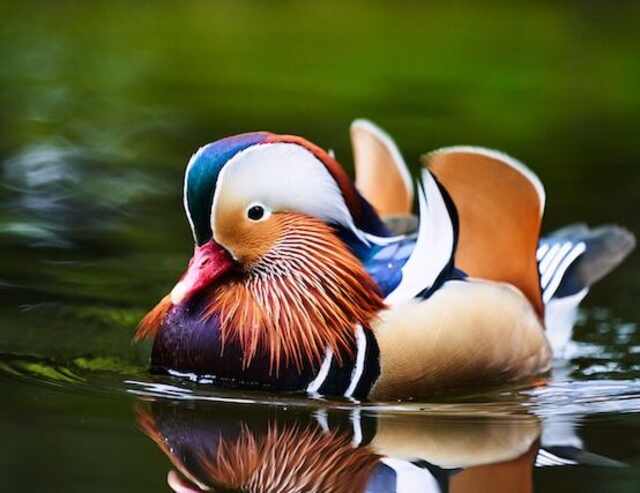
How to feed grapes to ducks safely
Tips on how much and how often to feed them
While feeding ducks can be an enjoyable activity, it is crucial to ensure safety measures are taken. Grapes are a healthy treat for ducks, but they should be given in moderation. Too many grapes can upset their stomach or contribute to obesity.
A good rule of thumb is to give each duck about one grape per day. This amount can be adjusted based on the size of the ducks and the other food they’re being given.
A small handful of grapes shared between several ducks is also an option. It’s important not to overfeed your feathered friends with grapes or any other treats.
Overfeeding can lead to health problems, such as malnutrition, weight gain, and digestive issues. Make sure that their daily diet includes a balanced mix of grains, vegetables, and protein sources.
Warning against overfeeding or feeding spoiled fruit
It’s essential that you don’t give too many grapes at once because it can cause them harm if they eat too much at one time. Feeding too many grapes could cause diarrhea or vomiting and could result in dehydration.
Another thing you need to watch out for is giving them spoiled fruit. Just like humans get sick from eating bad food, so do animals.
Grapes that have gone bad will mold and begin fermenting, which can make the duck ill or drunk. Spoiled fruit may have harmful bacteria or toxins that can cause sickness in your pet duck.
If you notice any signs of illness such as lethargy, loose stools or vomiting after feeding your duck with grape, then stop feeding immediately and take your pet bird to a vet as soon as possible.
It’s crucial not only how much but also what kind of food we give our feathered friends. Remember always feed only healthy fruits like fresh grapes.
Never give them raisins or grapes that have gone bad. Keep their diet varied and balanced with other foods, make sure they have access to fresh clean water and watch out for any signs of illness in your pet bird.
Other Fruits and Vegetables that are Safe for Ducks
In addition to grapes, there are many other fruits and vegetables that are safe and nutritious for ducks. Providing a variety of foods can help keep your feathered friends healthy and happy.
Here are some examples of other foods that ducks can eat:
- Leafy greens: kale, spinach, lettuce, and collard greens
- Fruits: apples, bananas, blueberries, strawberries, watermelon, oranges
- Vegetables: carrots, peas, green beans, corn
It’s important to note that while these foods are safe for ducks to eat in moderation as treats or snacks, they should not replace a duck’s regular diet or commercial feed. Too much of any one type of food can upset their digestive system.
List of Other Foods that Can be Given as Treats
In addition to the fruits and vegetables listed above, here is a list of other foods that ducks enjoy eating as treats: – Cooked rice or pasta
- Cooked eggs (scrambled or hard-boiled) – Mealworms
- Oatmeal (cooked) – Bread (in moderation)
Remember to always provide these treats in moderation. Treats should not make up more than 10% of a duck’s diet.
Explanation of Why Variety is Important in a Duck’s Diet
Just like humans need a variety of different nutrients from different foods to stay healthy and strong. Ducks also benefit from having diverse options in their diet.
A varied diet ensures they get all the vitamins and minerals they need for optimal health. Offering different types of food also helps keep things interesting for your feathered friends!
Ducks can become bored with the same old food day after day but offering new things keeps them excited about mealtime.
Furthermore , providing a diverse range of foods helps mimic their natural behavior and diet.
In the wild, ducks would have access to a variety of foods year-round, so offering a mix of foods closely replicates their natural diet.
Overall, providing ducks with a balanced and varied diet consisting of commercial feed, fruits, vegetables, and treats in moderation helps keep them healthy and happy.
Remember to always provide fresh water and monitor their food intake. With proper nutrition, your feathered friends can enjoy long and happy lives!
Conclusion
Summary of Key Points
Ducks are omnivorous birds that enjoy a diverse diet of plant matter, insects, and small aquatic animals. Domesticated ducks are often fed commercial feed, but they can also eat fruits like grapes as a treat.
Grapes are safe for ducks to consume in moderation and contain important vitamins and minerals that can benefit their health. When feeding grapes to ducks, it is important to ensure they are fresh and not spoiled.
Overfeeding or feeding too many treats can lead to health problems. It is recommended to give them grapes as an occasional treat rather than a regular part of their diet.
Final Thoughts on Feeding Grapes to Your Feathered Friends
Feeding your ducks grapes can be a fun way to bond with them and provide them with some extra nutrition.
However, it is important to remember that like any other animal, they have specific dietary needs that must be met in order for them to stay healthy.
In addition to grapes, there are many other fruits and vegetables that are safe for ducks to eat as treats.
Providing your ducks with a varied diet will ensure they get all the nutrients they need while also adding some excitement and variety into their lives.
Overall, feeding your feathered friends grapes can be a great way to show them you care while also providing them with some added nutrition.
Just remember to do so in moderation and always keep their dietary needs in mind!
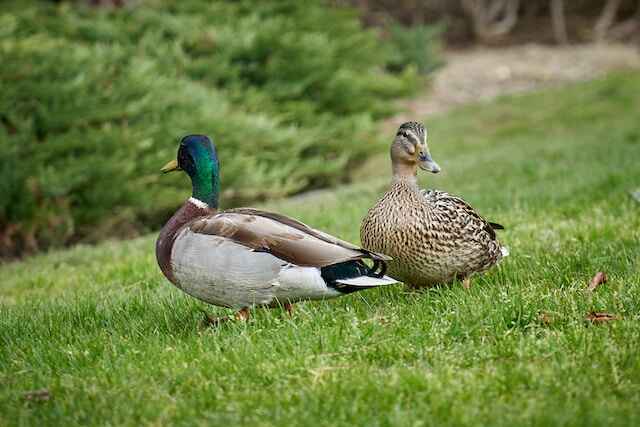
FAQs: Do Ducks Eat Grapes?
Can ducks eat grapes?
Yes, ducks can eat grapes but it should be given in moderation and sliced into small pieces to prevent choking.
Are grapes safe for ducks to eat?
Yes, grapes are safe for ducks to eat in moderation. However, avoid feeding them in large quantities as it can lead to digestive problems.
What other fruits can ducks eat?
Ducks can also eat other fruits like apples, berries, bananas, and watermelons in moderation and sliced into small pieces.
Can ducks eat grapes with the skin on?
It’s better to remove the skin of grapes before feeding them to ducks. The skin can be tough to digest and can cause digestive problems.
Can baby ducks eat grapes?
Baby ducks can eat grapes but only in very small quantities. It’s best to wait until they are a little older before introducing new foods.
Can ducks eat raisins?
Raisins are dried grapes and can be given to ducks in very small quantities as a treat. However, avoid giving them too many as it can lead to digestive problems.
Should grapes be given as a regular part of a duck’s diet?
No, grapes should not be given as a regular part of a duck’s diet. Grapes should be offered to ducks as an occasional treat, in limited amounts.
Can ducks eat frozen grapes?
Yes, ducks can eat frozen grapes as a refreshing treat on a hot day. However, make sure to thaw them first before feeding.
Can ducks eat grape seeds?
It’s better to remove the seeds of grapes before feeding them to ducks. The grape seeds pose a potential choking hazard and can also contribute to digestive issues when consumed by ducks.
Are there any risks of feeding grapes to ducks?
Feeding grapes to ducks in moderation is generally safe. However, overfeeding can lead to digestive problems and excessive sugar intake. Always make sure to slice grapes into small pieces and remove the skin and seeds before feeding.

